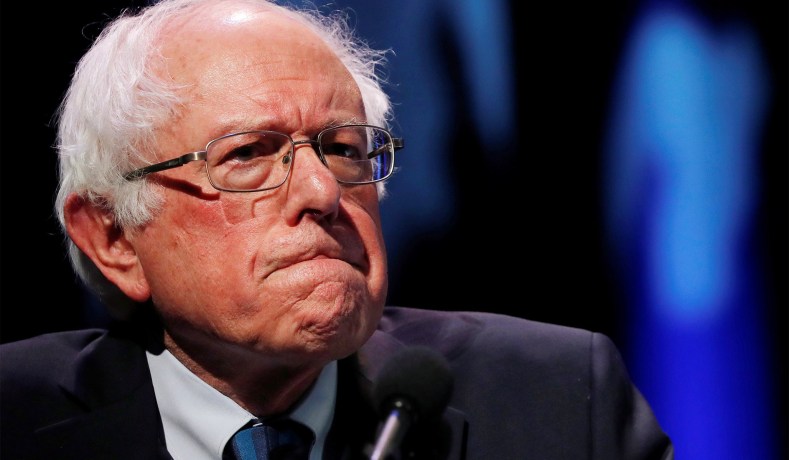Clever Democrats worry that the gentleman from Vermont won’t be able to defeat Trump in 2020.
‘Where is the wisdom we have lost in knowledge?” T. S. Eliot asked. “Where is the knowledge we have lost in information?”
And where is the intelligence we have lost in cleverness?
Cleverness is the plague of our political classes, an influenza of the intellect. The consultants are always trying to outsmart their rivals in the pettiest of ways and generally end up outsmarting themselves. The Affordable Care Act was and is a legislative and administrative train wreck, but it sure sounded clever (to someone) to be able to say it was a “Republican plan,” a “conservative proposal,” a creature of Mitt Romney or the American Enterprise Institute, etc. Never mind that that isn’t exactly true — it sure sounded clever!
(To someone.)
The clever people in the Democratic party have turned their attention to Senator Bernie Sanders, the creepy Brooklyn red who for some reason represents Vermont in the Senate, functionally as a member of the Democratic party, an equally creepy political organization to which he does not belong but whose presidential nomination he nonetheless is seeking a second time.
Stop Sanders! is the cry of the moment from Cambridge, Mass., to Tiburon, Calif., and everywhere that clever Democrats gather. The worry is that Senator Sanders’s grumpy-Muppet shtick will not discreetly charm the bourgeoisie, that his disheveled populism and his unmade bed of a mind will not be a smash hit with well-heeled swing voters in the moneyed suburbs of Pennsylvania, Wisconsin, Michigan, and Florida — which, the clever people inform us, is where the real action is going to be in 2020. They aren’t out there screaming “A vote for Sanders is a vote for Trump!” just yet, but they are scheming behind the scenes, and the moneymen of the party already are so alarmed that they are making approximately the same sound that Donald Sutherland makes at the end of Invasion of the Body Snatchers.
Senator Sanders is a misunderstood figure, in part because he himself started listening to the clever people once he began to look like a genuine threat to Herself in 2016. In the earliest part of that primary campaign, Senator Sanders was a slightly different kind of political animal, and a more authentic one: He was one part apocalyptic Berkeley sandwich-board screamer and one part . . . Donald Trump, as a matter of curious fact, and not just because of the honking outer-borough accent.
If you think “populist” means Donald Trump, then you might be forgiven for thinking that the enemy of populism is the Democratic party, its agenda, and its associates. If you think “populism” means Bernie Sanders, then you probably think that the enemy of populism is the Republican party, its agenda, and its associates. But “populism” encompasses both Donald Trump and Bernie Sanders, and its enemy is neither the Democratic party nor the Republican party but liberalism, here understood not in the illiterate contemporary political sense (nice NPR-listening people in sweaters with darling gay friends, also in sweaters) but in its proper sense, as the political order based on liberty in the form of individual rights to life, liberty, and property, secured against the state through the rule of law and procedural democracy.
Liberalism is associated with limited government, international accords based on certain necessarily universalist principles, and free enterprise, including free trade. Its principal rivals on the world stage are nationalism and socialism, which in the democratic theater present themselves as populism, a dynamic of opposition between the people as masses and loci of incumbent power, which are variously known, depending on the particular flavor of populism at play, as “elites,” “globalists,” “international bankers,” “Big Business,” “capitalism,” “the Jews,” “rootless cosmopolitans,” etc. Populism seeks to overrule liberalism, either categorically or in a piecemeal fashion as the whims of the people dictate.
Hence the substantial overlap between Sanders and Trump in 2016, on trade, on immigration, on military spending, on foreign policy, on Wall Street’s taxes, and much else. Sanders has evolved, as they say, most prominently in how he talks about immigration, a subject that occasionally put him on the wrong side of the intersectionality police. He remains much more of an immigration skeptic than is the median Democratic aspirant to the 2020 nomination, as his recent denunciation of “open borders” makes obvious enough. But gone is the strident and indeed nationalist tone of those 2016 union-hall meetings.
The Democrats are worried that even this kinder, gentler Bernie would not be able to defeat Trump in 2020. But they may have it backward: The 2016 union-hall Bernie’s frank embrace of both nationalism and socialism is probably a better representation of the actual ideals and aspirations of the majority of voters sympathetic to the Democratic party than is his new well-scrubbed and considerably more circumspect incarnation, which is more Ann Arbor than Flint, more UWS than UAW.
But if you’re good at chess you tend to see the world as a chessboard, and the clever people do not seek a grand strategy in which Senator Sanders leads the Democrats to victory — and, more dear to them, to a national repudiation of Donald Trump — in 2020. As they build imaginary coalitions, collating battleground states and cross-referencing interest groups, they see in the loopy gentleman from Vermont an instrument too unwieldy for the subtlety of their purposes.























